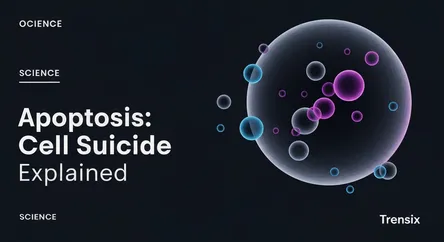Science
Apoptosis: Cell Suicide Explained

Discover apoptosis, the body's natural process of programmed cell death. Learn why it's crucial for health and its role in diseases like cancer.
What is it?
Apoptosis is the natural, orderly process of programmed cell death. Unlike necrosis, which is a messy death caused by injury, apoptosis is a highly controlled sequence where a cell essentially self-destructs without triggering an inflammatory response. This "cellular suicide" is a vital housekeeping function, crucial for eliminating old, damaged, or infected cells. It plays a key role in embryonic development, such as sculpting our fingers and toes from a webbed structure, and in maintaining tissue balance throughout our lives by removing billions of cells daily.
Why is it trending?
Research into apoptosis is a hot topic because of its deep connection to major diseases. Scientists are particularly interested in how cancer cells manage to evade apoptosis, allowing them to multiply uncontrollably. Consequently, many cutting-edge cancer therapies are designed to reactivate this self-destruct sequence in tumors. It's also central to research on neurodegenerative diseases like Alzheimer's and Parkinson's, where excessive apoptosis leads to the loss of vital neurons. New discoveries about the molecular pathways controlling apoptosis are constantly paving the way for innovative treatments.
How does it affect people?
Properly functioning apoptosis is essential for human health. A delicate balance is required: too little can lead to cancer or autoimmune diseases where the body fails to eliminate harmful cells. On the other hand, too much apoptosis contributes to tissue damage, immunodeficiency, and neurodegenerative disorders. For most people, this process works silently in the background, protecting them from potential threats. Understanding how to manipulate these cellular pathways is a cornerstone of modern medicine, offering hope for treating some of our most challenging health conditions.